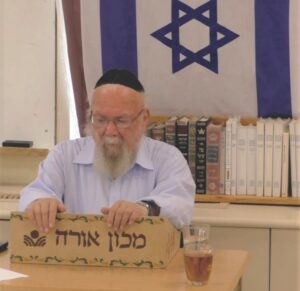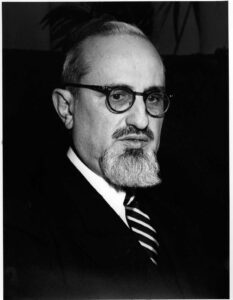The Ingathering and Medinat Yisrael
By Tzvi Fishman
To recite Hallel or not to recite Hallel, that is NOT the question. As Yom HaAtzmaut approaches, most people are aware of the disagreement surrounding the recital of the Hallel prayer of thanksgiving over the establishment of Medinat Yisrael. In alignment with the decree of the Chief Rabbinate of Israel, Religious Zionists happily recite the Hallel while the Haredi public does not. Summing up the halachic argument, a former Chief Rabbi of Israel, HaRav Ovadia Yosef, said that while each person could do as they pleased in the matter, certainly everyone should find a way to thank Hashem for the establishment of the State of Israel, if only because it provided a vessel to for the ingathering and refuge of millions of Jews and their settlement in the Land of Israel. The real question is, beyond reciting the Hallel, how can this feeling of gratitude be most perfectly expressed?
 In order to examine the proper response toward the founding of the Jewish State (even in light of its shortcomings and problems as it struggles to reach its ultimate form), we will quote extensively from the wonderful book written by HaRav Yaacov Filber and translated from the Hebrew by Rabbi Moshe Lichtman, “Dawn of Redemption.” Rabbi Filber points out that in the Rambam’s assertion that the coming of Mashiach and the Redemption of Israel are certified by the Torah, the Rambam’s proof doesn’t mention Mashiach at all. This is what the Rambam writes in “The Laws of Kings and Their Wars”:
In order to examine the proper response toward the founding of the Jewish State (even in light of its shortcomings and problems as it struggles to reach its ultimate form), we will quote extensively from the wonderful book written by HaRav Yaacov Filber and translated from the Hebrew by Rabbi Moshe Lichtman, “Dawn of Redemption.” Rabbi Filber points out that in the Rambam’s assertion that the coming of Mashiach and the Redemption of Israel are certified by the Torah, the Rambam’s proof doesn’t mention Mashiach at all. This is what the Rambam writes in “The Laws of Kings and Their Wars”:
“Anyone who does not believe in him (Mashiach), or one who does not anticipate his arrival, denies not only the rest of the prophets, but (also) the Torah and Moshe Rabbeinu. After all, the Torah testified about him (Mashiach), as it says, ‘The Lord your God will return your captivity and have mercy on you, and He will return and gather you… If your dispersed will be at the ends of the heavens… from there the Lord your God will gather you and from there He will take you. And the Lord your God will bring you to the Land (Devarim 30:3-5).’ These explicit words in the Torah encompass everything that was stated (later on) by all of the Prophets” (Chapter 11:1).

One cannot help but note that when the Rambam brings his Torah proof of Mashiach, the verses do not mention Mashiach at all, but rather about the ingathering of the exiles. HaRav Filber writes:
“In recent times, we have been privileged to witness the liquidation of the exiles of distress.’ Our Jewish brethren who were in distress and captivity, in Eastern Europe and Africa, have merited to go forth from darkness to light and from servitude to Redemption. A large portion of these refugees have ascended to our eternal Homeland. That is the joyous aspect of our era. At the same time, however, large numbers of Jews who are exiled in lands of comfort are still immersed in a deep slumber.”
In his treatise “Midbar Shur” on the weekly Torah portion, Rabbi Kook explains a prophecy in the Book of Isaiah which states: “It shall be on that day, a great shofar will be blown, and those lost in the land of Assyria and those cast aside in the land of Egypt will come and bow to the Lord, on the Holy Mountain in Jerusalem” (Isaiah, 27:13). What is the reason for the redundancy, Rabbi Kook asks, regarding the exiles of Assyria and Egypt, and of “those lost” and those “cast aside”? Analyzing the Hebrew words in the text, Rabbi Kook explains: “The Jewish people find themselves in two types of exiles in the wilderness of the nations. One is an exile of oppression and servitude, an exile that afflicts the lives of the Jews and causes them to be outcasts like the Egyptian exile. The second type of exile is an exile of comfort, one that gives the Jews brief, imaginary satisfaction in which they gain equal rights and economic prosperity. Oftentimes, however, this causes the exiled Jews to lose their connection to Judaism. Both of these types of exile endanger the existence of Am Yisrael, one in a physical way and one in a spiritual way. The prophet assures us that the Master of the Universe will save us from both of these exiles and bring us to our Land.”
HaRav Filber goes on to discuss another similar idea which appears in the book “Yemei Zikaron” by the highly-regarded Rabbi Yosef Dov Soloveitchik who equates the “lost ones” in Isaiah’s prophecy with the hundreds-of-thousands of Jews being lost in the American exile. To illustrate his point, he uses the tale of Rabbah bar Bar Chana, found in Tractate Bava Batra (73b):

“It once happened that we were sailing on a boat and we saw a (gigantic) fish whose back was covered with sand and reeds had sprouted from it. We thought it was dry land, so we disembarked on it and baked and cooked on its back. When the fish’s back grew hot, it turned over. Had our boat not been nearby, we would have drowned.”
Rav Kook also uses the “back of a whale” as a parable for the illusionary stability of exile, but he applies it to the entire exile, in a general way. Rabbi Soloveitchik uses it to focus in on the American exile. He writes:
“We are making the same bitter mistake that all the ‘lost ones’ have made throughout history. We think that we have arrived on safe shores and that our suffering, troubles, and wanderings are over. Finally, we can leave the boat that has been swaying back and forth at sea and alight upon safe shores and a stable place of tranquility. Behold, the ground is green, there is beautiful scenery all around, and the conditions are good and promising. The Jews, who are naturally energetic and initiating, hasten to take hold of and settle down in this ‘dry (meaning seemingly permanent) land,’ to succeed there and engage in all of the professions and businesses, and develop them.”
HaRav Filber writes that despite the similarities between Rabbi Kook’s and Rav Soloveitchik’s explanations, there is a recognizable difference between the conclusions they draw. This difference stems from their divergent approaches to the Gemara’s concluding words: “And had our boat not been nearby, we would have drowned.” What is the “boat” that saves Diaspora Jews from “drowning”? According to Rav Soloveitchik, the boat that saves Jews from drowning in exile is the lifeboat of Jewish Heritage. He writes:
“In their zeal to forget their past and their origins, many of our “lost ones” utterly abandoned the boat of Jewish Heritage immediately upon setting foot on dry land. Therefore, when the whale turns over, they have nowhere to return to.”
The message is clear: the danger of living on the back of the whale threatens only those Jews who abandon the Torah, but those tens-of-thousands of Jews who are loyal to Torah and mitzvot are safe from the danger of drowning.
HaRav Filber explains:
 “Rav Soloveitchik, who personally experienced the pain of losing Jews in America, is trying to suggest in this interpretation a solution to the plague of assimilation. In his opinion, the danger of living on the whale’s back is the abandonment of Jewish Tradition, and the lifeboat is the boat of Jewish Heritage.’ The message being given to American Jewry is that if you persist in learning Torah and observing mitzvot here in the American exile, the dangers of the whale’s back overturning will not affect you and you shall not drown.”
“Rav Soloveitchik, who personally experienced the pain of losing Jews in America, is trying to suggest in this interpretation a solution to the plague of assimilation. In his opinion, the danger of living on the whale’s back is the abandonment of Jewish Tradition, and the lifeboat is the boat of Jewish Heritage.’ The message being given to American Jewry is that if you persist in learning Torah and observing mitzvot here in the American exile, the dangers of the whale’s back overturning will not affect you and you shall not drown.”
In contrast, HaRav Filbert points out, when Rabbi Kook writes about the danger of the whale’s back, he cites not only the spiritual danger of drowning in a foreign culture, but the physical danger as well. Examples of this throughout Jewish history are plentiful, but we will suffice with what happened on the back of the whale of the European exile, during the Holocaust, which ravaged both secular and deeply religious Jews. According to Rabbi Kook, there is no safe haven from the all-encompassing danger of the exile, even for the Torah world. Therefore, the only lifeboat for the Jewish people in exile is Eretz Yisrael, as our Sages teach referring to Noah’s ark:
“But the dove did not find rest – had she found rest, she would not have returned. Similarly, Israel dwelled among the nations, but found no rest (Eichah 1:3) – had she found rest, she would not have returned (Bereshit Rabbah 33:8).
Faithful to his opinion, Rabbi Kook published, – already in the year 1907, thirty years before the Holocaust – his “Great Call to Eretz Yisrael,” in which he addresses the entire House of Israel with a heartfelt plea:
“Come to the Land of Israel, dear brothers; come to the Land of Israel. Save your souls; save the souls of your future generations, the souls of our entire Nation. Save our people from desolation and destruction, from decay and debasement, from defilement and evil, from all the troubles and distress that they are likely to encounter in all the lands of the nations, without exception or distinction… Run for your lives and come to Eretz Yisrael… Flee and gather in the Land of Israel.”
Indeed, the State of Israel invests great effort to rescue our brethren from the lands of oppression and to bring them back to their Homeland. Our hearts go out to these endangered Jews who have been ‘cast aside.’ At the same time, however, even though new programs of “Jewish Identity” and “Connection to Israel” are initiated every year, are we doing enough or are we reconciling ourselves to the decline of our brothers who are “lost” in the comfortable exiles? Our Redemption cannot be complete until all the Jews dwell in the Land. Therefore, we in Israel, besides saying Hallel in gratitude for the gift of Medinat Yisrael which facilitates the ingathering of the exiles and our pathway to complete Redemption and the subsequent establishment of Hashem’s Kingship over the world, we can all do a bit more, each and every one of us, to attract those who remain behind in the comfortable exiles, in America, France, England, Australia, Canada, Mexico City, and South Africa. As for them, the Jews in these illusionary islands of refuge, the most meaningful expression of thanks to Hashem for the gift of Medinat Yisrael is to hop on the lifeboat of Aliyah which is ready to take them home.
HaRav Filber concludes:
“How fortunate are we to be living during these momentous times; let us do everything in our power to make sure that we also deserve it.”
The book, “The Dawn of Redemption” is available at: http://toratzion.com/






